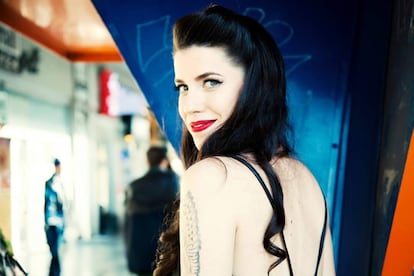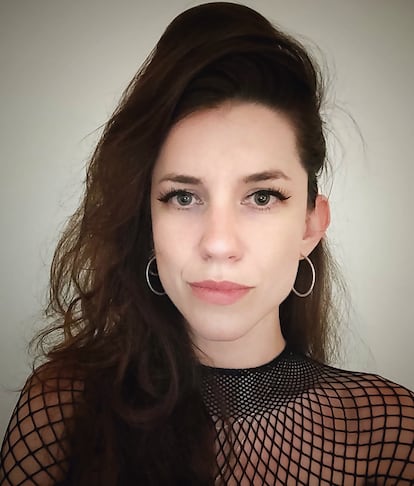Paulina Tuchschneider, Israeli army deserter and novelist: ‘They called me hysterical for talking about the anxiety of being a soldier’
The author’s debut novel explores the mental suffering young women face in when fulfilling their mandatory military service


Israel is one of the few countries where women are required to serve in the military. The duration of their service is 24 months, which is one year shorter than that of men. Paulina Tuchschneider was born in Zabrze, Poland in 1987, and moved with her family to Tel Aviv at the age of two. She underwent training in the Israel Defense Forces (IDF), but failed to complete her service and deserted. Tuchschneider said she felt like an outsider. “I felt like an alien. The army just wasn’t where I belonged.” This experience inspired her to write a story about a soldier engaged in a different sort of battle — a feminine one — where she was surrounded by people, yet never truly one of them. During a video call from her apartment in Ramat Gan, near Tel Aviv, she shares her story while her husband and cats occasionally drift into view.
A video editor of the investigative journalism television program Hamakor (The Source, in English), Tuchschneider published her debut novel in 2022, Girl Soldier (recently translated into Spanish by Esther Cross and titled La Soldada). It’s semi-autobiographical fiction that sparked conversations in Israel, revealing the absurdity of war and the mental toll on young recruits who find themselves holding an M16 in one hand and shampoo in the other as they wait in line at the communal showers.
Tuchschneider’s biting style takes readers on a rollercoaster of laughter and horror. Inspired by her own life, she weaves a fictional tale of an 18-year-old soldier’s psychological deterioration who has lost comrades-in-arms and more during the 2006 Lebanon War. Assigned to a military base in northern Israel, she despises the compliant young women wearing beaded berets who never question the forced military sisterhood and their destiny.
Question. Your novel sparked a lot of debate. How was it received?
Answer. In Israel, many men disliked it, while others loved it. A lot of men criticized me, calling me hysterical and whiny for talking about the anxiety of being a soldier. I received similar comments from men in Argentina, where it’s available in Spanish. But it doesn’t have to be like that. Many Israeli women reached out to me, sharing their experiences of feeling alone and scared in the army. They too felt like they didn’t belong. Despite all the pointed criticism, it has been incredible to discover that there are many other women who feel the same way.
Q. The story isn’t always about bombs and gunfire. It also talks a lot about the women’s blemishes, cellulite and fear of wetting the bed. Why does the body play such a big role in setting the tone of your novel?
A. Because not enough has been said about those things. We have plenty of books about war, but I wanted to explore anxiety — the battle within — the struggle to contain emotions and survive. The soldier does everything she can until war ultimately overwhelms her. Her body betrays her, revealing insights beyond the reach of the mind.
Q. Shame is another character in the novel. The heroine of your story realizes that some of the female soldiers she trained with no longer say hello.
A. I live in a country that has a big challenge during times of war. If you’re a soldier, it’s expected that you fulfill your duty. I wanted to write about people who struggle as soldiers, particularly when military service is compulsory for everyone. The feeling of shame is a crucial part of these situations. They may have failed as soldiers, but not as individuals. When you no longer fit in a group and get kicked out, you feel shame about not having the strength to keep going. I don’t want to pass judgment on whether this is right or wrong, but it does make you feel like you’ve failed.
Q. In the novel, the protagonist feels it’s unfair that people in Tel Aviv are making decisions for her during the war.
A. It’s written from the perspective of a really young woman. It’s about what you’re thinking when you’re 18 and all you really want to do is party, drink and have a good time. Even though you know you’re supposed to be a soldier, you secretly hope you never have to go to war. It’s totally normal to wonder, “Are they really doing what’s best for us?” And when that thought keeps popping up, it’s really hard to be a good soldier because fear creeps in and you start getting all cynical.
Q. At one point during the war, she starts wondering: “Does anyone actually have a plan?”
A. Yeah, that was a major criticism of the Second Lebanon War [in 2006]. And now, we’re feeling the same way with this war. Does anyone even have a plan for what comes next? Are they really doing everything they can to keep us safe? Sometimes it just feels like everything is so complicated.

Q. What’s different now?
A. I’ve never been as scared as I have been since October 7 [the date of the Hamas attack]. I think this is the end of the nation of Israel. Hamas is at my door and I feel like they could just kidnap or kill me. This is the end. Back in 2006, it wasn’t this bad. Sure, there were missiles, but now those missiles are hitting Tel Aviv. This is the worst thing that has happened to us since the Holocaust. It’s a whole different kind of war now.
Q. What do you think the female soldiers are thinking about now?
A. I think about them a lot. These women are so brave, and I actually get to connect with them through my work. The stories they share leave me speechless. For the first time ever, women in Israel are fighting in tanks. That’s always been such a huge deal and people used to say they couldn’t do it. On one hand, I’m in awe of these incredible women, fighting for their country during such a tough time. But on the other hand, I can’t help but wonder... are there women who are scared? Women who just want to go home? I keep picturing those women saying to themselves, “I don’t want to fight. I’m afraid.”
Q. Do you think it’s a feeling that people still have nowadays, where the protagonist admits that she never really thought about the enemy or the lives of the Palestinians?
A. We’ve got a problem here in Israel that we’re not really facing. I mean, Hamas is just horrible. But let’s not forget about the two million people living in Gaza. Their leaders are the absolute worst, and so are ours. Both Israel and Palestine have the worst governments right now because nobody cares about finding a solution. But that doesn’t mean we have to be cruel to Palestinians. Sometimes we just ignore the problem. We just want to live our lives like the main character in my book and avoid all the drama. But you can’t ignore something that blows up in your face. You can’t ignore what’s happening in your neighborhood, when it’s all around you.
Q. What can be done about it?
A. This situation is a ticking time bomb. I’ve never been this sad. I used to believe that there were good people on both sides and that we could find a solution. But now, all I can think about is how the violence will escalate and this war will continue to expand.
Q. Your novel is going to be made into a movie. How do you picture it?
A. Remember Saving Private Ryan with all those dramatic battle scenes and grenades exploding? Well, it’s not going to be like that. I want scenes like the one in the shower, you know, with women taking out tampons, trying to find a place to dry their towels, and lathering shampoo into their hair. I’ve already written the screenplay and my husband will direct it, so it’ll be perfect.
Sign up for our weekly newsletter to get more English-language news coverage from EL PAÍS USA Edition
Tu suscripción se está usando en otro dispositivo
¿Quieres añadir otro usuario a tu suscripción?
Si continúas leyendo en este dispositivo, no se podrá leer en el otro.
FlechaTu suscripción se está usando en otro dispositivo y solo puedes acceder a EL PAÍS desde un dispositivo a la vez.
Si quieres compartir tu cuenta, cambia tu suscripción a la modalidad Premium, así podrás añadir otro usuario. Cada uno accederá con su propia cuenta de email, lo que os permitirá personalizar vuestra experiencia en EL PAÍS.
¿Tienes una suscripción de empresa? Accede aquí para contratar más cuentas.
En el caso de no saber quién está usando tu cuenta, te recomendamos cambiar tu contraseña aquí.
Si decides continuar compartiendo tu cuenta, este mensaje se mostrará en tu dispositivo y en el de la otra persona que está usando tu cuenta de forma indefinida, afectando a tu experiencia de lectura. Puedes consultar aquí los términos y condiciones de la suscripción digital.








































